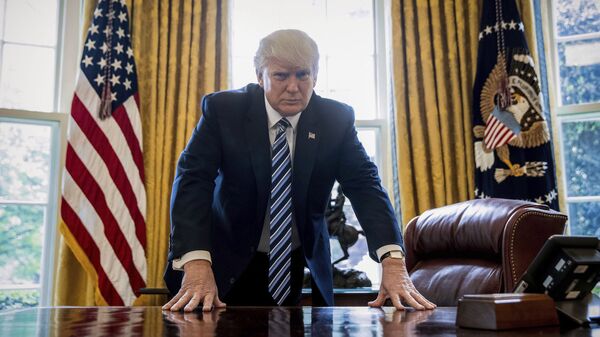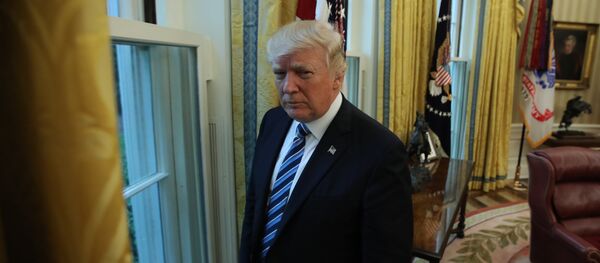A covert "cold civil war" between US President Donald Trump and the US political and media establishment is raging on in Washington, Russian political commentator and journalist Viktor Marakhovsky noted in his recent op-ed for RIA Novosti.
The journalist called attention to the fact that in the course of events celebrating his first 100 days in office Trump has yet again pointed the finger of blame at the US mainstream media, accusing them of downplaying his achievements.
"Mainstream (FAKE) media refuses to state our long list of achievements, including 28 legislative signings, strong borders & great optimism!" Trump tweeted.
Mainstream (FAKE) media refuses to state our long list of achievements, including 28 legislative signings, strong borders & great optimism!
— Donald J. Trump (@realDonaldTrump) 29 апреля 2017 г.
Moreover, Trump became the first US president to skip the traditional White House Correspondents' Dinner since the time of Ronald Reagan who was recovering from his assassination attempt back in 1981.
"It's easy to see that the confrontation between the American media machine and the US administration, which began long before the November elections, did not fade away. It transformed into a protracted positional war with determined roles. On the one hand, there is a 'chatterbox' president 'who does not fulfill his promises.' On the other hand, there is a 'media mafia, bombarding society with lies'," Marakhovsky observed.
In mid-April a Gallup opinion poll reported that an increasingly smaller number of Americans believe that the US president will deliver on his promises.
"President Donald Trump's image among Americans as someone who keeps his promises has faded in the first two months of his presidency, falling from 62% in February to 45%," Gallup wrote on April 17.
At the same time, according to a Quinnipiac University National Poll, only 39 percent of American respondents believe that "most members of the news media are honest."
An April Gallup poll indicates a similar trend, saying that six in 10 Americans see partisan bias in news media.
"Sixty-two percent of US adults say the media has a favorite, up from about 50% in past years," the report reads.
Commenting on the figures, Marakhovsky highlighted that "American society… attaches great importance to the honesty of the main institutions — starting from the government institutions and ending with finance and media."
So, long story short, the ongoing infighting between the Trump administration and the US establishment significantly harms their reputation, the journalist noted, adding that both political camps are well aware of that.
"One side understands that it is doing damage to the whole system in the long run. And the second side understands this perfectly as well. But the 'warring parties' cannot stop the confrontation, bring mutual attacks to a halt and calm down, because right now their status and position depend on how painfully they hit their rivals. A crisis is a situation when the principle 'you die today, and I'll die tomorrow' becomes justified [in the eyes of rivals]," Marakhovsky elaborated.
Curiously enough, the ongoing political strife doesn't affect US foreign policy and Washington's attitude toward Russia, the journalist pointed out.
"Here, the basic values of both sides remain intact, and the positions of seemingly irreconcilable parties overlap," Marakhovsky remarked, referring to the Idlib chemical incident in Syria which was unanimously blamed on President Bashar al-Assad by both pro-Trump and anti-Trump forces, although no evidence has been yet presented to back their claims.
Similarly, the image of Russia in the eyes of American elites remains unchanged.
"No matter who occupies the Oval Office, the US mainstream media continues to depict [Russia] as dark 'Mordor,' which supports dictators for the dictatorship's sake," the journalist noted ironically.


